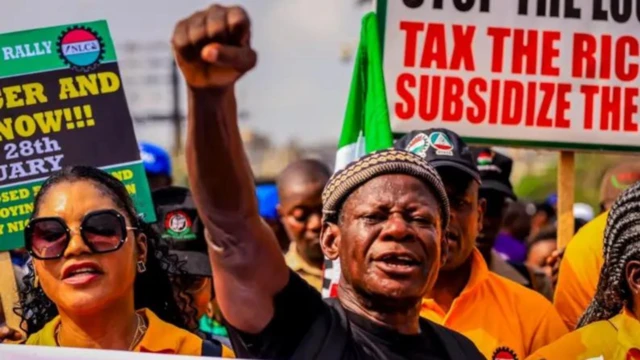Today marks Workers’ Day, also known as May Day, a global celebration of the contributions of workers to national development. But in Nigeria, this year’s commemoration unfolds against a backdrop of worsening economic hardship and mounting frustration.
Since the Bola Tinubu administration implemented key economic reforms—namely the removal of fuel subsidies and the floating of the naira—the cost of living has soared. The ripple effects have been severe, with inflation eroding incomes and pushing millions of Nigerians into deeper financial strain. Amid this crisis, labour unions have renewed calls for a living wage.
In response to months of agitation, President Tinubu approved a new minimum wage of ₦70,000. The increase was meant to cushion the impact of inflation and policy reforms. However, implementation has been patchy.
According to civic organisation BudgIT, only 17 states had adopted the new minimum wage as of April 2025. Many private sector employers have also yet to comply, citing rising operational costs.
Data from the National Bureau of Statistics (NBS) paints a grim picture: headline inflation stood at 23.18% in March 2025, with food inflation surging to 40.01%—a sharp blow to workers already grappling with stagnant wages and job insecurity.
Despite ongoing challenges, the Federal Government has reiterated its commitment to improving workers’ welfare. In a statement marking the occasion, Senate President Godswill Akpabio praised Nigerian workers for their dedication and resilience.
“Today, we celebrate the hard work and dedication of Nigerian workers,” Akpabio said through his Special Adviser on Media and Publicity, Eseme Eyiboh. “Despite obvious challenges, you remain the backbone of our economy. I salute your unwavering commitment to excellence and productivity. Your contributions are vital to our nation’s progress.”
First Lady Remi Tinubu also paid tribute to the Nigerian workforce, describing their efforts across all sectors as unmatched.
“Whether in the public or private sector, formal or informal economy, Nigerian workers remain the backbone of our development,” she said in a statement issued Wednesday evening. “This year’s Workers’ Day is a reminder of the dignity of labour and the importance of building a fair and inclusive economy.”
As workers across the country reflect on their sacrifices and the state of labour in Nigeria, many continue to demand not just recognition, but real reforms—fair wages, job security, safe working conditions, and policies that prioritise their welfare in more than just words.


